If you want to know about the Permeable concrete or Islamic architecture or staircase design, please click the link.
Introduction
Tile flooring is a popular choice for many homeowners and commercial spaces due to its durability, versatility, and aesthetic appeal. It refers to the installation of tiles, typically made of materials like ceramic, stone, vinyl, laminate, wood, concrete, cork, mosaic, metal, glass, or terracotta, as the primary surface for a floor.

Here are some key points to consider about tile flooring:
- Durability: Tiles are known for their durability and long-lasting nature. They can withstand high foot traffic, resist wear and tear, and maintain their appearance for years with proper maintenance.
- Versatility: Tile flooring offers a wide range of design options to suit various styles and preferences. Tiles come in different shapes, sizes, colors, patterns, and textures, allowing for endless possibilities in creating unique and customized looks.
- Aesthetic Appeal: Tile flooring can enhance the overall aesthetics of a space. Whether you prefer a sleek and modern look, a classic and elegant style, a rustic or natural ambiance, or a vibrant and artistic design, there is a tile option to match your desired aesthetic.
- Easy Maintenance: Tiles are relatively easy to clean and maintain. They are resistant to stains, spills, and moisture, making them suitable for areas prone to frequent cleaning, such as kitchens and bathrooms. Regular sweeping and mopping are usually sufficient to keep tile floors looking clean and fresh.
- Different Material Options: Tiles are available in various materials, each with its unique characteristics and benefits. Ceramic and porcelain tiles offer durability and water resistance. Stone tiles provide a natural and luxurious feel. Vinyl and laminate tiles offer cost-effective alternatives with realistic designs. Wood tiles bring warmth and elegance. Concrete tiles provide a modern and minimalist appeal. The choice of material depends on factors like the desired aesthetic, durability, maintenance requirements, and budget.
- Professional Installation: Proper installation is crucial for ensuring the longevity and functionality of tile flooring. It is recommended to hire professional installers who have expertise in tile installation techniques, such as proper subfloor preparation, adhesive application, and grouting, to achieve the best results.
When considering tile flooring, it’s important to assess your specific needs, preferences, and the characteristics of different tile materials. Factors such as the location of the installation, desired aesthetics, maintenance requirements, durability, and budget should be taken into account to select the right tile flooring option for your space. Consulting with experts or professionals in the field can provide valuable guidance in making an informed decision.
Choosing the right tile for flooring is crucial for several reasons. Firstly, the type of tile you select significantly impacts the overall aesthetics of your space. Tiles come in a wide range of colors, patterns, and finishes, allowing you to create a desired look and style that complements your interior design scheme.
Whether you prefer a sleek and modern appearance, a rustic and natural ambiance, or a vibrant and playful atmosphere, the choice of tile can help you achieve your desired aesthetic goals.
Secondly, tile selection greatly influences the durability and longevity of your flooring. Different types of tiles offer varying levels of durability and resistance to wear and tear. For instance, ceramic and porcelain tiles are known for their strength and ability to withstand heavy foot traffic, making them suitable for high-traffic areas such as entryways and kitchens.
On the other hand, certain natural stone tiles like marble or slate may require more careful maintenance due to their porous nature.
Lastly, the maintenance requirements of different tile options can vary significantly. Some tiles, such as vinyl or laminate, are known for their low-maintenance characteristics, requiring only regular sweeping and occasional mopping.
Others, like natural stone tiles, may require specialized cleaning products and sealing to maintain their appearance and prevent staining. By choosing the right tile that aligns with your lifestyle and maintenance preferences, you can ensure that your flooring remains beautiful and hassle-free.
1) Ceramic Tiles
Ceramic tiles are a popular choice for flooring due to their composition and characteristics. These tiles are made from a mixture of clay, sand, and other natural materials.
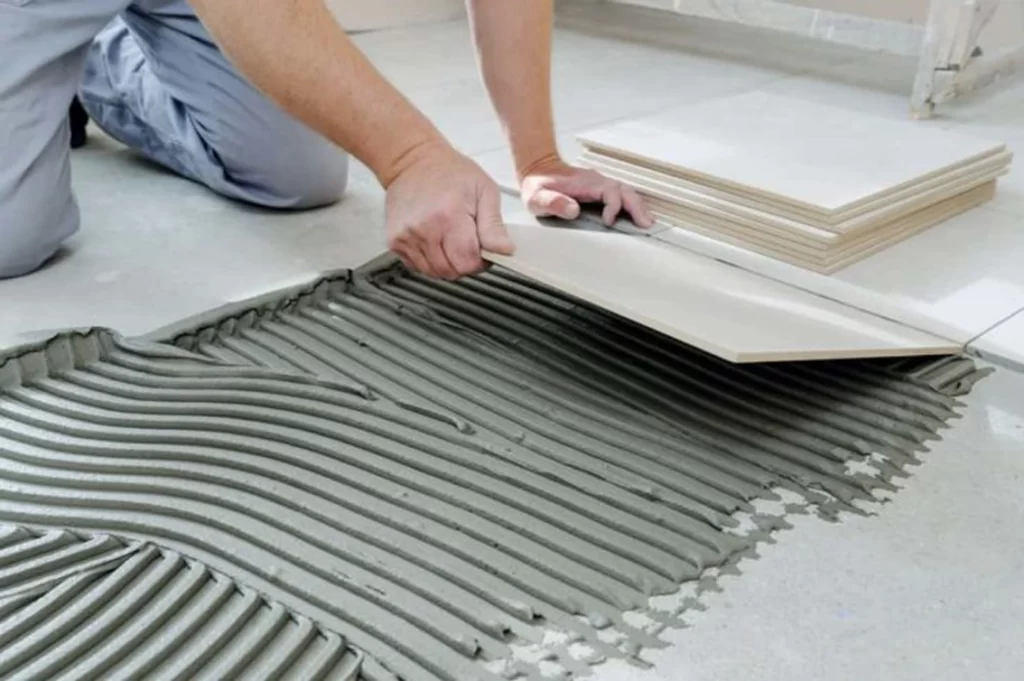
The mixture is then shaped into tiles and fired at high temperatures to create a durable and versatile product. Ceramic tiles come in various sizes, shapes, colors, and finishes, offering a wide range of design options for different interior styles.
Ceramic tiles are known for their strength and resilience. They have a hard surface that can withstand heavy foot traffic, making them suitable for both residential and commercial applications.
Additionally, ceramic tiles are resistant to moisture and stains, making them a practical choice for areas prone to spills or high humidity, such as bathrooms and kitchens. They are also resistant to fading, making them suitable for areas exposed to sunlight.
i) Types Ceramic Tiles:
Porcelain Tiles:

Porcelain tiles are a type of ceramic tile that is particularly renowned for its exceptional durability and water resistance. These tiles are made from fine porcelain clay that is fired at higher temperatures compared to non-porcelain ceramic tiles.
This firing process results in a denser and less porous tile, making porcelain tiles highly resistant to water absorption and ideal for areas where moisture is a concern. Porcelain tiles are available in various styles and finishes, including matte, polished, and textured.
Non-Porcelain Tiles:
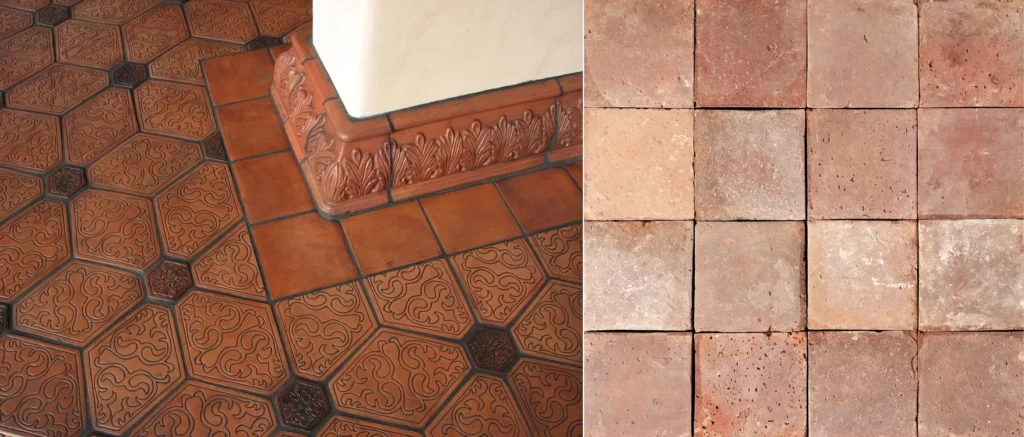
Non-porcelain ceramic tiles, also known as earthenware or terracotta tiles, are another type of ceramic tile. Unlike porcelain tiles, non-porcelain tiles have a higher water absorption rate due to their porous nature.
These tiles are suitable for low-traffic areas such as bedrooms and living rooms. They are available in a wide range of designs, patterns, and sizes, allowing for creative and unique flooring options.
ii) Pros and Cons:
Pros of Ceramic Tiles for Flooring:
- Durability: Ceramic tiles are highly durable and can withstand heavy foot traffic without easily chipping or cracking.
- Water Resistance: Porcelain tiles, in particular, have excellent water resistance, making them suitable for areas exposed to moisture.
- Wide Range of Styles: Ceramic tiles offer a plethora of design options, including various colors, patterns, and finishes, allowing for customization to match any interior style.
- Low Maintenance: Ceramic tiles are relatively easy to clean and maintain, requiring regular sweeping and occasional mopping.
- Scratch-resistant
- Stain-resistant
- Water-resistant
- Durable, especially the glazed option
Cons of Ceramic Tiles for Flooring:
- Cold and Hard: Ceramic tiles can feel cold underfoot, especially in cooler climates. They also lack the warmth and cushioning of materials like carpet.
- Professional Installation: Proper installation of ceramic tiles requires expertise to ensure a level and durable surface, which may require professional assistance.
- Grout Lines: The presence of grout lines between ceramic tiles can accumulate dirt and require periodic cleaning and maintenance.
- May crack if you drop heavy items
- Not suitable for outdoor areas
By understanding the composition, types, and pros and cons of ceramic tiles, you can make an informed decision when selecting them for your flooring needs.
2) Stone Tiles
Stone tiles offer a timeless and natural beauty that adds elegance and durability to any space. There are two main types of stone tiles: natural stone and engineered stone.
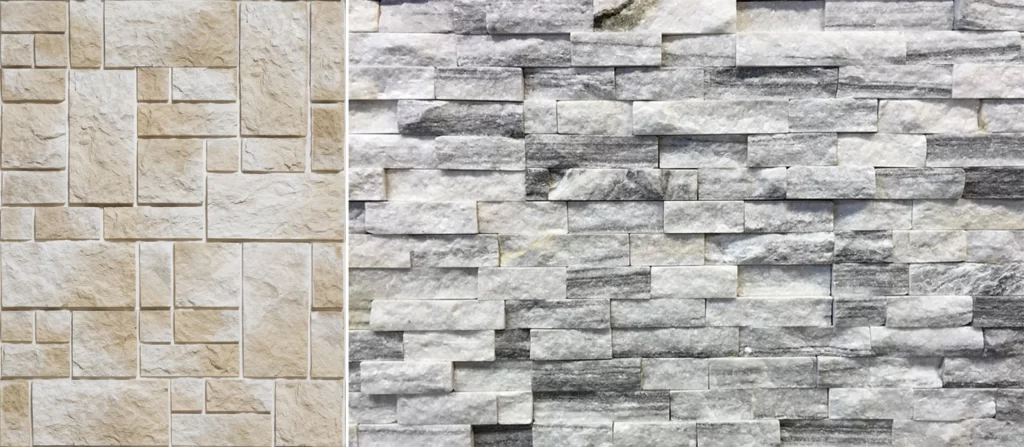
Natural stone tiles are quarried from the earth, while engineered stone tiles are manufactured by combining crushed stone and resin to create a durable and versatile product.
Natural stone tiles, such as marble, granite, and slate, exhibit unique variations in color, pattern, and texture, making each tile one-of-a-kind.
Engineered stone tiles, on the other hand, can be engineered to have a more consistent appearance and can mimic the look of natural stones.
i) Types Stone Tiles:
Marble Tiles:
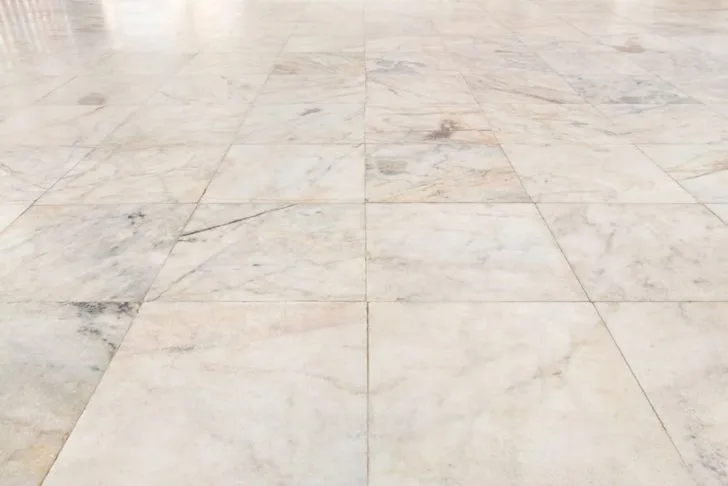
Marble tiles are synonymous with luxury and elegance. Known for their smooth surface, rich veining, and range of colors, marble tiles add a touch of sophistication to any space.
They are often used in areas where aesthetics are a priority, such as entryways, bathrooms, and countertops. Marble tiles require regular maintenance to preserve their beauty and should be sealed to protect against staining.
Granite Tiles:
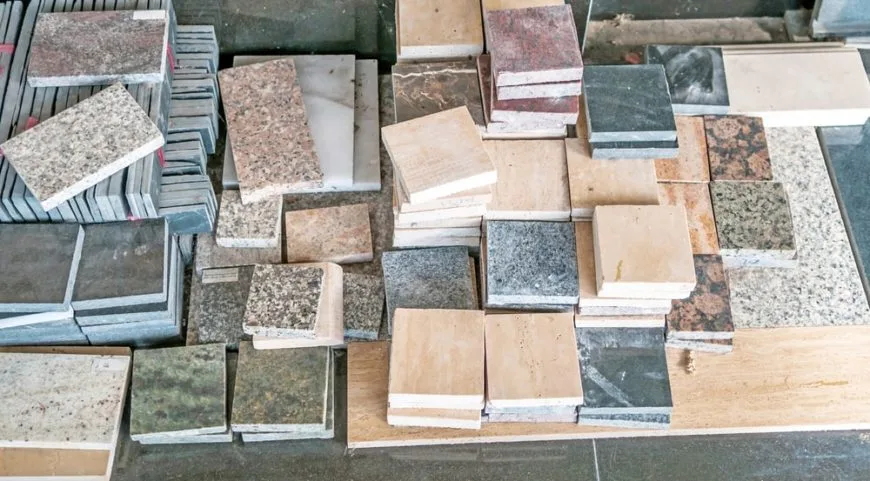
Granite tiles are prized for their exceptional durability and unique patterns. They are known for their strength, making them suitable for high-traffic areas like kitchens and hallways.
Granite tiles come in a variety of colors and have a natural resistance to heat and scratches, making them an excellent choice for kitchen countertops. However, they may require periodic sealing to maintain their stain resistance.
Slate Tiles:
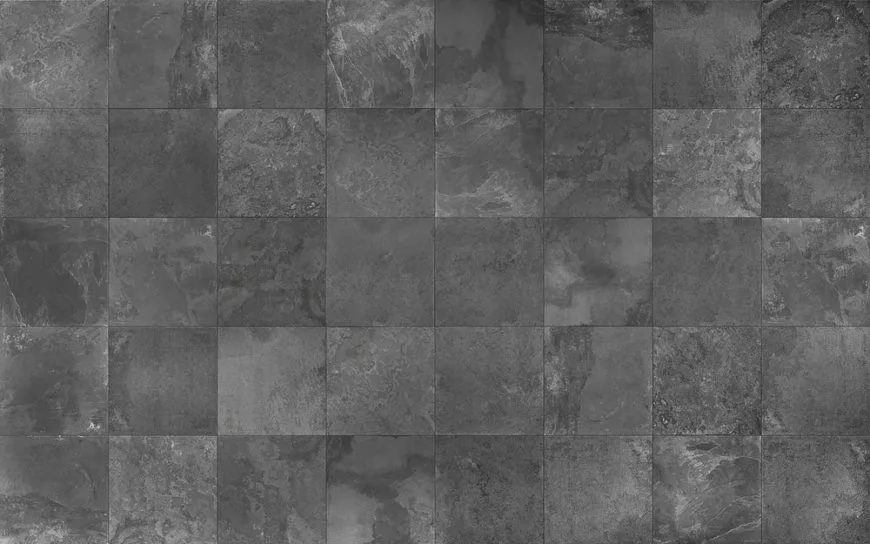
Slate tiles are renowned for their rustic charm and earthy colors. They have a naturally slip-resistant surface, making them ideal for areas prone to moisture, such as bathrooms and poolside.
Slate tiles are highly durable and can withstand heavy use. They require minimal maintenance and can be used indoors or outdoors to create a cohesive design.
ii) Pros and Cons:
Pros of Stone Tiles for Flooring:
- Natural Beauty: Stone tiles offer a unique and natural aesthetic that adds elegance and character to any space.
- Durability: Stone tiles, particularly granite and slate, are highly durable and can withstand heavy foot traffic.
- Heat Resistance: Stone tiles, such as granite, have excellent heat resistance, making them suitable for kitchen countertops.
- Value: Stone tiles are considered a premium flooring option and can increase the value of a property.
Cons of Stone Tiles for Flooring:
- Cost: Stone tiles, especially natural stone varieties like marble and granite, tend to be more expensive compared to other flooring options.
- Maintenance: Natural stone tiles may require regular sealing and specialized cleaning products to preserve their appearance.
- Porosity: Some natural stone tiles, like marble and slate, can be porous and may require extra care to prevent staining or moisture damage.
Considering the characteristics, pros, and cons of stone tiles will help you make an informed decision when selecting them for your flooring needs.
3) Vinyl Tiles
Vinyl tiles are a popular choice for flooring due to their cost-effectiveness and versatility. These tiles are made from a synthetic material called polyvinyl chloride (PVC) that is highly durable and resilient.
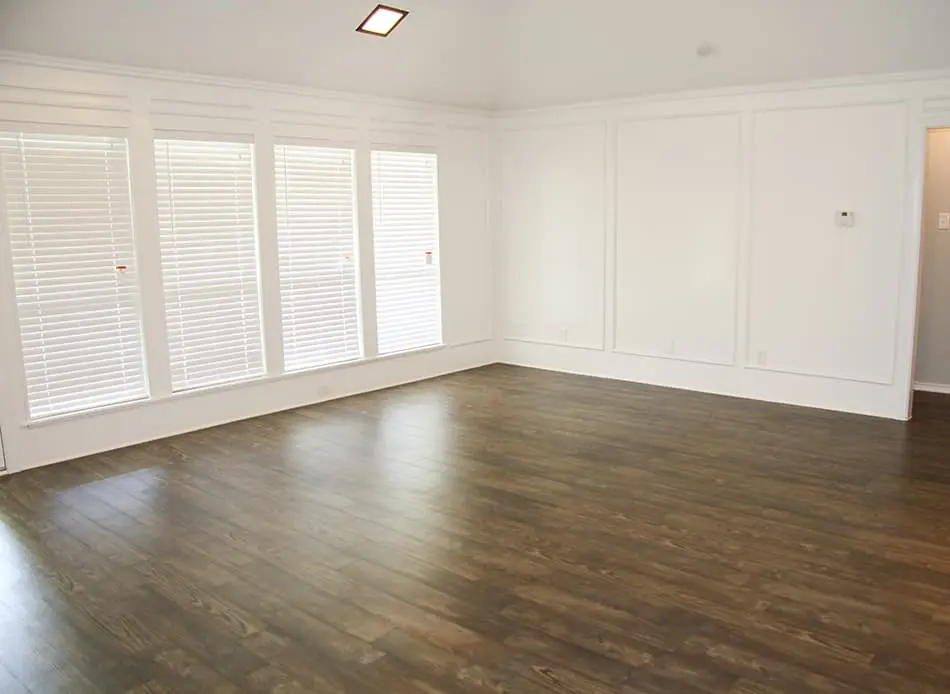
Vinyl tiles offer a wide range of design options, including various colors, patterns, and textures, allowing for creativity and customization in any space.
Vinyl tiles are known for their affordability, making them a budget-friendly flooring option. They are commonly used in residential and commercial settings, offering a practical and stylish solution for different areas.
i) Types Vinyl Tiles:
Luxury Vinyl Tiles (LVT):
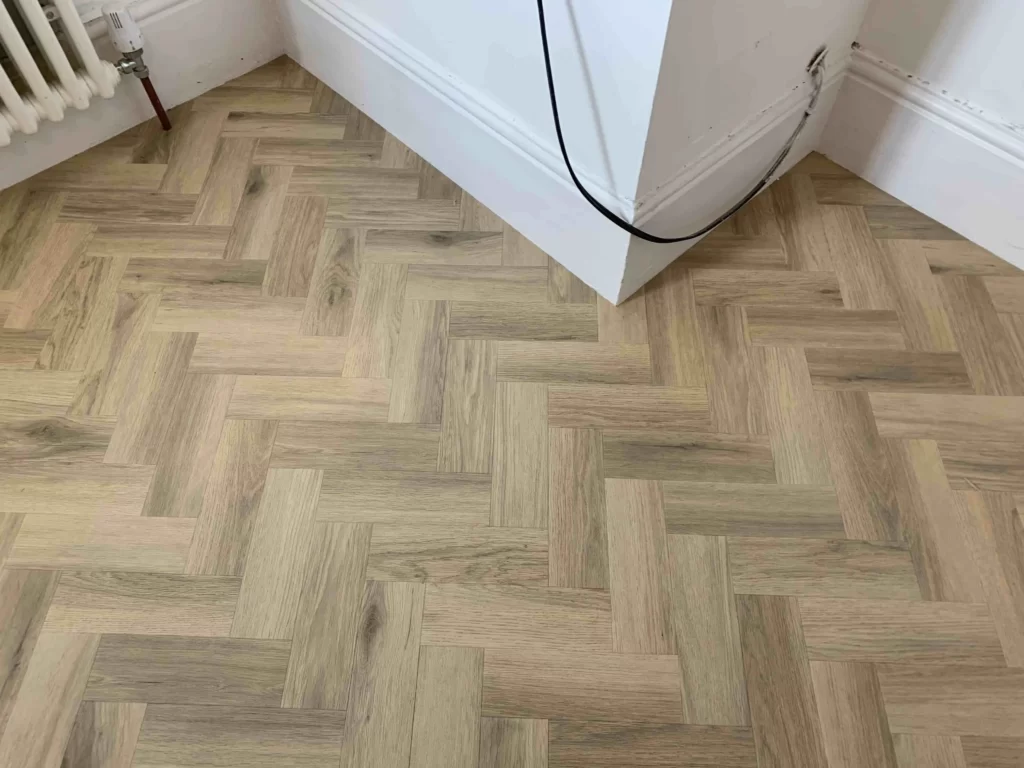
Luxury vinyl tiles, often referred to as LVT, are known for their realistic designs that closely resemble natural materials like wood, stone, or tile. They offer the aesthetic appeal of these materials without the higher cost or maintenance requirements.
LVT is highly durable, resistant to scratches and stains, and can withstand heavy foot traffic. Additionally, they provide a comfortable underfoot feel due to their resilient nature.
Vinyl Composite Tiles (VCT):
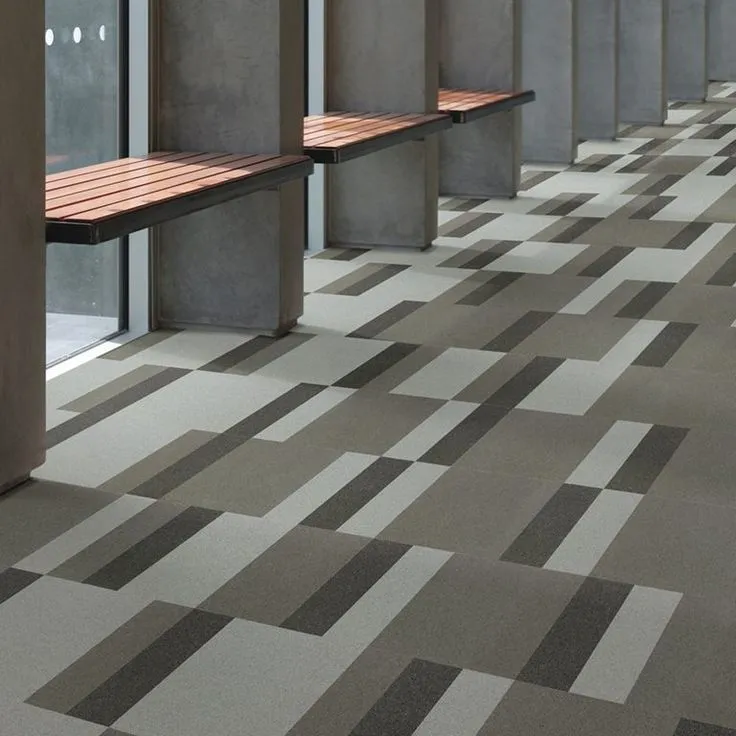
Vinyl composite tiles, also known as VCT, are commonly used in commercial applications. They are composed of a mixture of vinyl, mineral fillers, and binders. VCT is known for its durability, affordability, and ease of maintenance.
These tiles are available in a wide range of colors and patterns, making them suitable for various commercial environments such as offices, retail spaces, and healthcare facilities.
ii) Pros and Cons:
Pros of Vinyl Tiles for Flooring:
- Cost-effective: Vinyl tiles are an affordable flooring option, making them suitable for budget-conscious projects.
- Versatility: Vinyl tiles offer a wide range of design options, allowing for customization and creativity in any space.
- Durability: Both LVT and VCT are highly durable and can withstand heavy use, making them suitable for high-traffic areas.
- Low Maintenance: Vinyl tiles are relatively easy to clean and maintain, requiring regular sweeping and occasional mopping.
Cons of Vinyl Tiles for Flooring:
- Susceptible to Scratches: While vinyl tiles are generally durable, they may be susceptible to scratches from sharp objects or heavy furniture.
- Limited Repairability: In case of damage, vinyl tiles may need to be replaced entirely, as repairs can be challenging or impossible.
- Environmental Considerations: Some vinyl tiles may contain certain chemicals and may not be considered an environmentally friendly option.
Considering the advantages and disadvantages of vinyl tiles will help you determine if they are the right choice for your flooring needs, taking into account factors such as budget, desired aesthetics, and maintenance requirements.
4) Laminate Tiles
Laminate tiles are a popular choice for flooring due to their construction and appearance. These tiles are composed of multiple layers of materials, typically including a high-density fiberboard (HDF) or particleboard core, a decorative layer, and a wear layer.
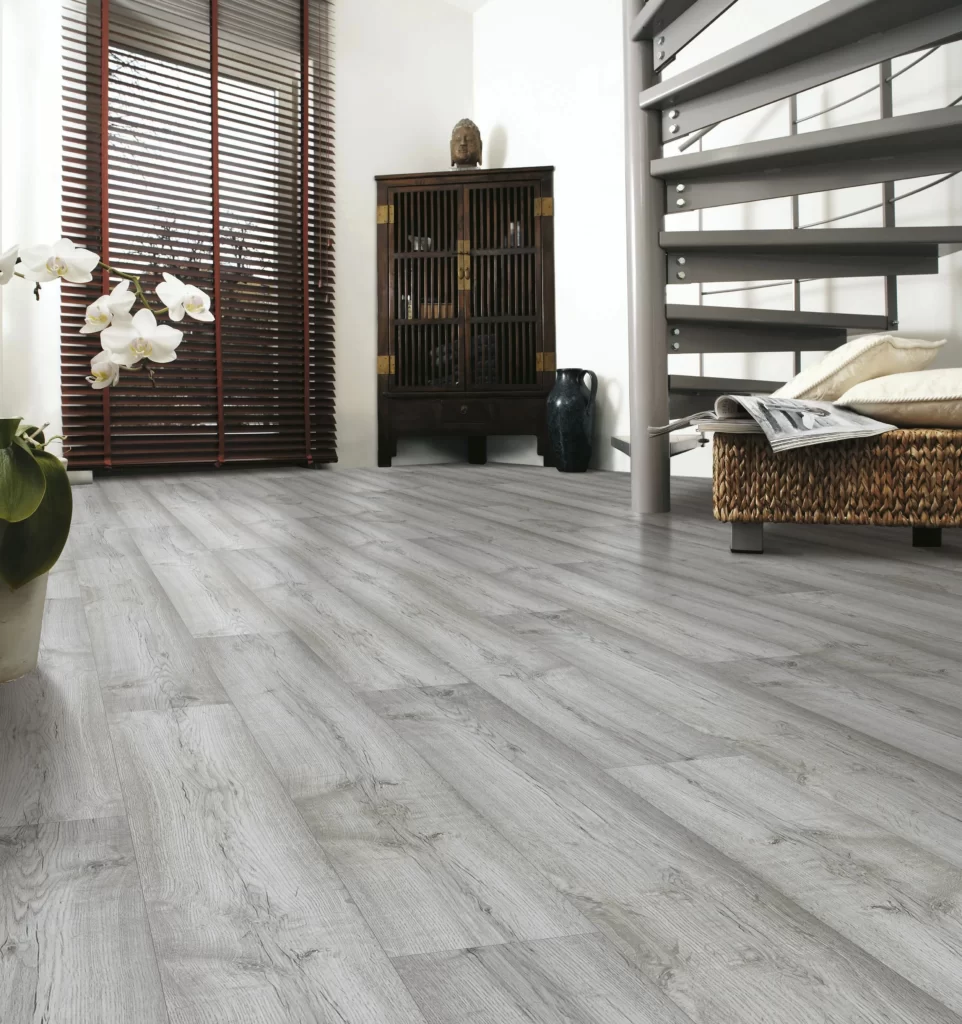
The decorative layer replicates the appearance of various materials such as hardwood, stone, or tile. Laminate tiles offer a cost-effective alternative to natural materials while providing a durable and attractive flooring solution.
Laminate tiles are available in a wide range of styles, colors, and patterns, allowing for versatile design options that can complement different interior aesthetics.
i) Types Laminate Tiles:
High-Pressure Laminate (HPL):
High-pressure laminate, often referred to as HPL, is known for its durability and moisture resistance. HPL tiles are manufactured using high-pressure and heat, resulting in a denser and more durable product.
The wear layer of HPL tiles provides excellent protection against scratches, stains, and fading. Additionally, HPL tiles have enhanced moisture resistance, making them suitable for areas prone to moisture, such as kitchens and bathrooms.
Direct-Pressure Laminate (DPL):
Direct-pressure laminate, also known as DPL, is a more affordable option compared to HPL tiles. DPL tiles are manufactured using direct pressure and heat, resulting in a slightly less dense product compared to HPL. They offer good durability and are resistant to stains, fading, and wear. DPL tiles are known for their ease of installation, often featuring a click-lock system that allows for straightforward DIY installation.
ii) Pros and Cons:
Pros of Laminate Tiles for Flooring:
- Cost-effective: Laminate tiles provide a more budget-friendly option compared to natural materials like hardwood or stone.
- Versatile Design Options: Laminate tiles offer a wide range of styles, colors, and patterns, allowing for customization to match various interior designs.
- Durability: Laminate tiles are highly durable, resistant to scratches, and can withstand heavy foot traffic.
- Moisture Resistance: Some laminate tiles, particularly HPL, have enhanced moisture resistance, making them suitable for areas prone to moisture.
Cons of Laminate Tiles for Flooring:
- Moisture Sensitivity: While HPL tiles offer better moisture resistance, laminate tiles, in general, are not suitable for areas with excessive moisture, such as bathrooms or basements.
- Limited Repairability: In the event of significant damage, individual laminate tiles may be challenging to repair, often requiring replacement of the affected area.
- Not as Authentic as Natural Materials: While laminate tiles can closely replicate the appearance of natural materials, they may not provide the exact look and feel of the real thing.
Considering the advantages and disadvantages of laminate tiles will help you make an informed decision when selecting them for your flooring needs.
It’s important to consider factors such as budget, desired aesthetics, durability, and maintenance requirements to choose the most suitable option for your space.
5) Wood Tiles
Wood tiles offer a classic and elegant flooring option that adds warmth and beauty to any space. They are a popular choice for homeowners looking to bring the natural charm of wood into their interiors.
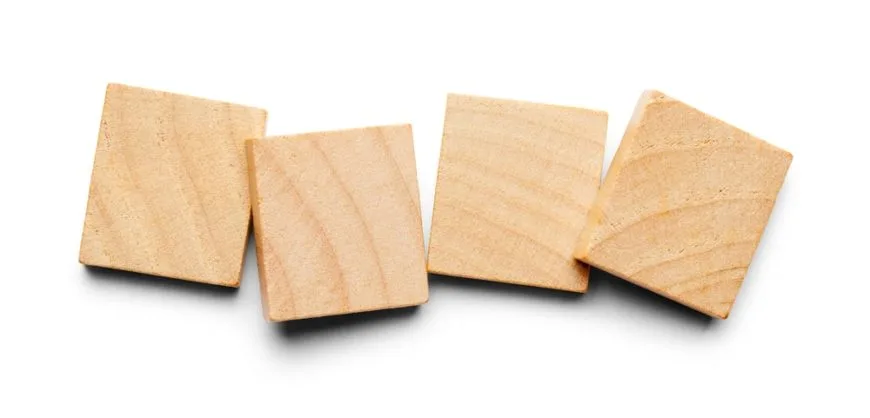
Wood tiles are available in various species, finishes, and sizes, allowing for versatility and customization to suit different design styles.
Wood tiles provide the aesthetic appeal of hardwood flooring while offering enhanced durability and stability. They are an excellent choice for areas where traditional hardwood may not be suitable due to moisture or installation constraints.
Types of Wood Tiles:
Solid Wood Tiles:
Solid wood tiles are made from a single piece of solid wood, typically cut into a tile-like shape. They showcase the natural beauty and unique grain patterns of the wood species used. Solid wood tiles are known for their durability and longevity, as they can be sanded and refinished multiple times to restore their original appearance.
They create a luxurious and timeless look in any space, adding value to a home. However, solid wood tiles may require additional care and maintenance, and they are not recommended for areas with high moisture levels.
Engineered Wood Tiles:
Engineered wood tiles consist of a real wood veneer layer bonded to multiple layers of plywood or high-density fiberboard (HDF). This construction provides stability and resistance to moisture, making engineered wood tiles suitable for a wider range of applications, including bathrooms and basements.
They offer versatility in terms of installation options, such as glue-down or floating installations. Engineered wood tiles come in various finishes and styles, mimicking the appearance of solid wood. They are also more dimensionally stable than solid wood tiles, making them less prone to expansion and contraction due to environmental changes.
Pros and Cons:
Pros of Wood Tiles for Flooring:
- Natural Beauty: Wood tiles provide a warm and inviting aesthetic, adding elegance and charm to any room.
- Durability: Both solid wood and engineered wood tiles are known for their durability and longevity.
- Value: Wood tiles can increase the value of a property and are highly sought after by homebuyers.
- Versatility: Wood tiles come in a wide range of species, finishes, and sizes, allowing for customization and versatility in design.
Cons of Wood Tiles for Flooring:
- Maintenance: Wood tiles, particularly solid wood, may require regular maintenance, such as refinishing or sealing, to maintain their appearance.
- Moisture Sensitivity: Solid wood tiles are sensitive to moisture and may not be suitable for areas with high humidity or frequent exposure to water.
- Cost: Wood tiles, especially solid wood, can be more expensive than other flooring options.
- Installation Constraints: Some wood tiles may have specific installation requirements or limitations.
Considering the advantages and disadvantages of wood tiles will help you make an informed decision when selecting them for your flooring needs.
It’s important to consider factors such as budget, desired aesthetics, maintenance requirements, and the specific conditions of the installation area to choose the most suitable option for your space.
6) Concrete Tiles
Concrete tiles offer a modern and minimalist appeal, adding a sleek and contemporary touch to any space. They have gained popularity in recent years for their industrial aesthetic and durability.
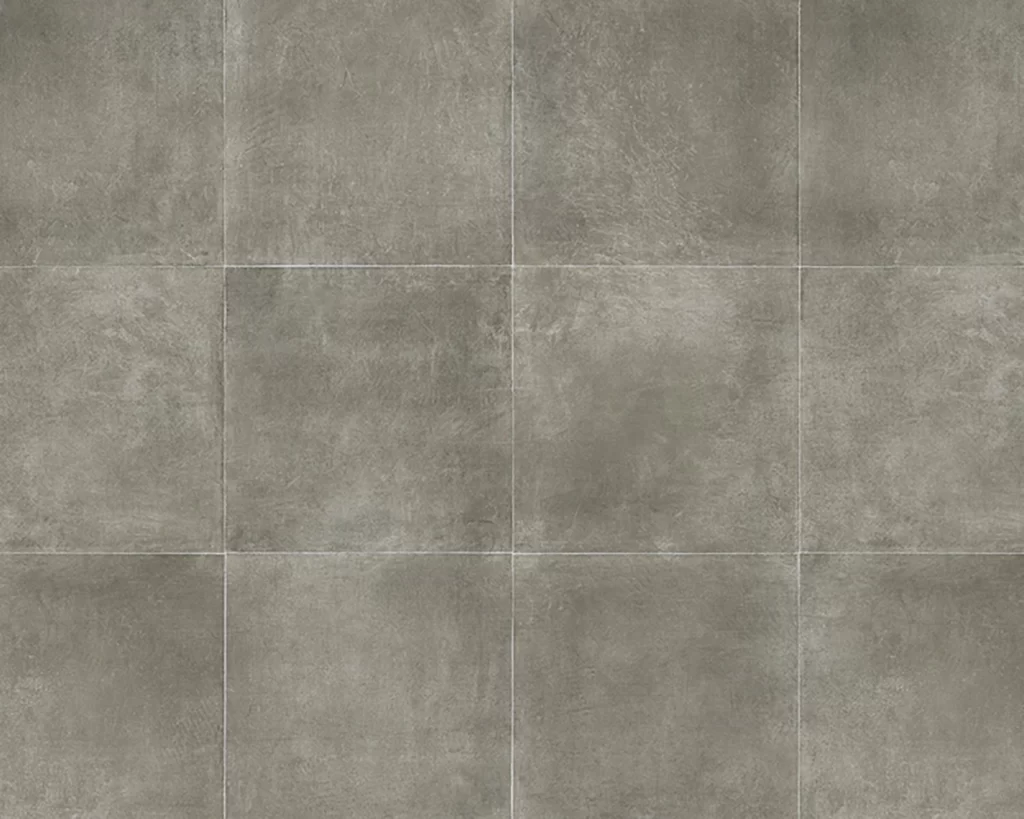
Concrete tiles are known for their versatility and ability to complement various design styles, making them a popular choice for both residential and commercial interiors.
Concrete tiles can be customized in terms of color, texture, and finish, allowing for creative and unique flooring designs. They provide a clean and sophisticated look that adds a sense of modernity to any room.
i) Types of Concrete Tiles:
Polished Concrete Tiles:
Polished concrete tiles are known for their sleek and smooth surface, achieved through a grinding and polishing process. These tiles have a reflective appearance, resembling polished stone. Polished concrete tiles offer exceptional durability and resistance to stains, scratches, and abrasion.
They are low-maintenance and can be easily cleaned with minimal effort. Additionally, polished concrete tiles can be customized with various dyes or aggregates to create unique patterns or designs.
Stained Concrete Tiles:
Stained concrete tiles provide a decorative and customizable option for flooring. These tiles are treated with acid-based or water-based stains that penetrate the surface, creating a rich and translucent color effect. Stained concrete tiles offer a wide range of colors and shades, allowing for creative expression and customization.
They can mimic the appearance of natural stone or create unique patterns and designs. Stained concrete tiles are durable and low-maintenance, making them suitable for both residential and commercial applications.
ii) Pros and Cons:
Pros of Concrete Tiles for Flooring:
- Modern Aesthetic: Concrete tiles offer a modern and minimalist appeal, adding a sleek and contemporary look to any space.
- Durability: Concrete tiles are highly durable and resistant to stains, scratches, and wear, making them suitable for high-traffic areas.
- Customization: Concrete tiles can be customized in terms of color, texture, and finish, allowing for unique and creative flooring designs.
- Low Maintenance: Concrete tiles are relatively low-maintenance, requiring regular sweeping and occasional mopping.
Cons of Concrete Tiles for Flooring:
- Hardness: Concrete tiles can be hard underfoot, which may require the use of area rugs or mats for added comfort.
- Professional Installation: Concrete tiles often require professional installation due to their specialized installation techniques.
- Susceptibility to Stains: While concrete tiles can be resistant to stains, certain substances and chemicals may cause discoloration if not promptly cleaned.
- Cold Surface: Concrete tiles may feel cold underfoot, especially in cooler climates or during winter months.
Considering the advantages and disadvantages of concrete tiles will help you make an informed decision when selecting them for your flooring needs.
It’s important to consider factors such as desired aesthetics, durability, maintenance requirements, and comfort to choose the most suitable option for your space.
7) Cork Tiles
Cork tiles offer a unique and eco-friendly flooring option that combines sustainability with comfort. Cork is derived from the bark of cork oak trees, making it a renewable and environmentally friendly material.
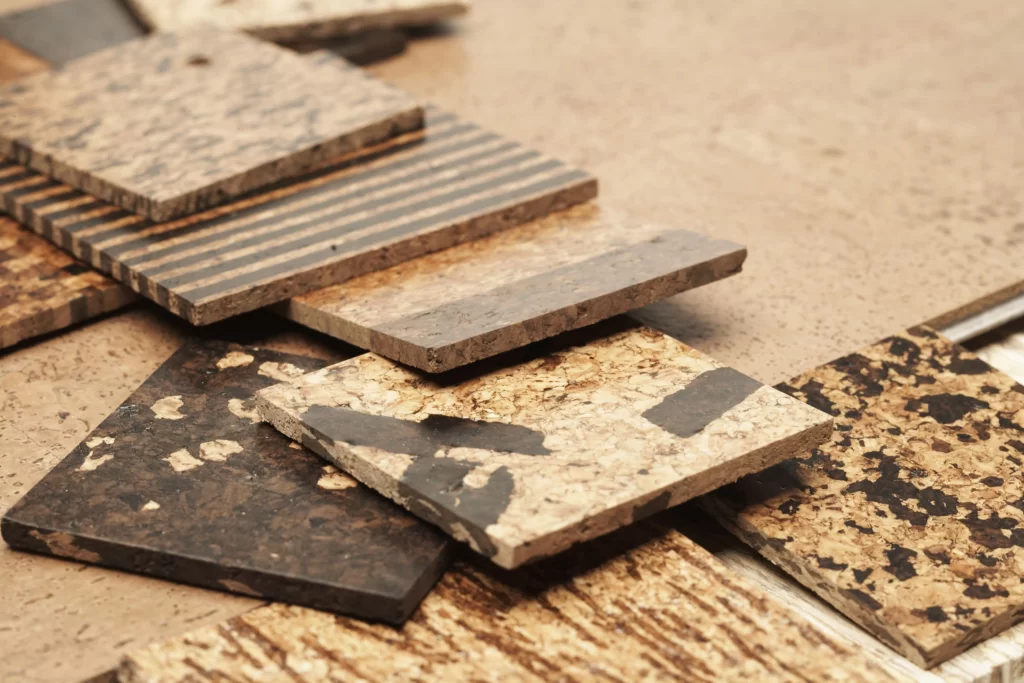
Cork tiles are known for their natural warmth, softness, and cushioning effect underfoot, providing a comfortable surface for walking and standing. They offer a distinctive look that adds warmth and character to any space.
Cork tiles are also highly regarded for their excellent insulation and sound absorption properties, making them suitable for both residential and commercial applications.
i) Types Cork Tiles:
Solid Cork Tiles:
Solid cork tiles are made from solid pieces of cork, providing natural insulation and sound absorption properties. These tiles are known for their soft and comfortable feel underfoot. Solid cork tiles offer excellent thermal and acoustic insulation, helping to maintain a comfortable temperature and reduce noise transmission within a room.
They are also hypoallergenic, resistant to mold and mildew, and naturally repel insects. Solid cork tiles come in a variety of colors and patterns, allowing for creative and customized flooring designs.
Engineered Cork Tiles:
Engineered cork tiles consist of a layer of cork veneer bonded to a composite backing, such as high-density fiberboard (HDF) or cork composite. This construction enhances the durability and moisture resistance of the tiles. Engineered cork tiles offer greater stability and dimensional integrity, making them suitable for areas with fluctuating humidity levels.
They are also more resistant to impacts and wear, making them ideal for high-traffic areas. Engineered cork tiles come in various finishes and designs, offering versatility and options to suit different aesthetic preferences.
ii) Pros and Cons:
Pros of Cork Tiles for Flooring:
- Eco-Friendly: Cork tiles are a sustainable and renewable flooring option, as they are derived from the bark of cork oak trees without harming the trees.
- Comfortable and Soft: Cork tiles offer a soft and cushioning feel underfoot, providing comfort and reducing strain on joints and feet.
- Excellent Insulation: Cork tiles provide natural thermal and acoustic insulation, helping to maintain a comfortable temperature and reduce noise transmission.
- Durability: Cork tiles are resistant to impacts, scratches, and wear, making them suitable for high-traffic areas.
- Hypoallergenic and Moisture Resistant: Cork tiles are naturally hypoallergenic and resistant to mold, mildew, and insects.
Cons of Cork Tiles for Flooring:
- Vulnerability to Sharp Objects: Cork tiles may be susceptible to damage from sharp objects and heavy furniture without proper protection.
- Fading in Sunlight: Prolonged exposure to direct sunlight may cause cork tiles to fade over time.
- Sealant and Maintenance: Cork tiles require periodic sealing and maintenance to protect the surface and maintain their appearance.
- Limited Design Options: While cork tiles offer various colors and patterns, the range of design options may be more limited compared to other flooring materials.
Considering the advantages and disadvantages of cork tiles will help you make an informed decision when selecting them for your flooring needs.
It’s important to consider factors such as eco-friendliness, comfort, insulation, durability, maintenance requirements, and design preferences to choose the most suitable option for your space.
8) Mosaic Tiles
Mosaic tiles offer a unique and visually appealing option for flooring, adding creativity and personality to any space. They are composed of small individual pieces, known as tesserae, which are assembled to create intricate patterns, designs, and images.
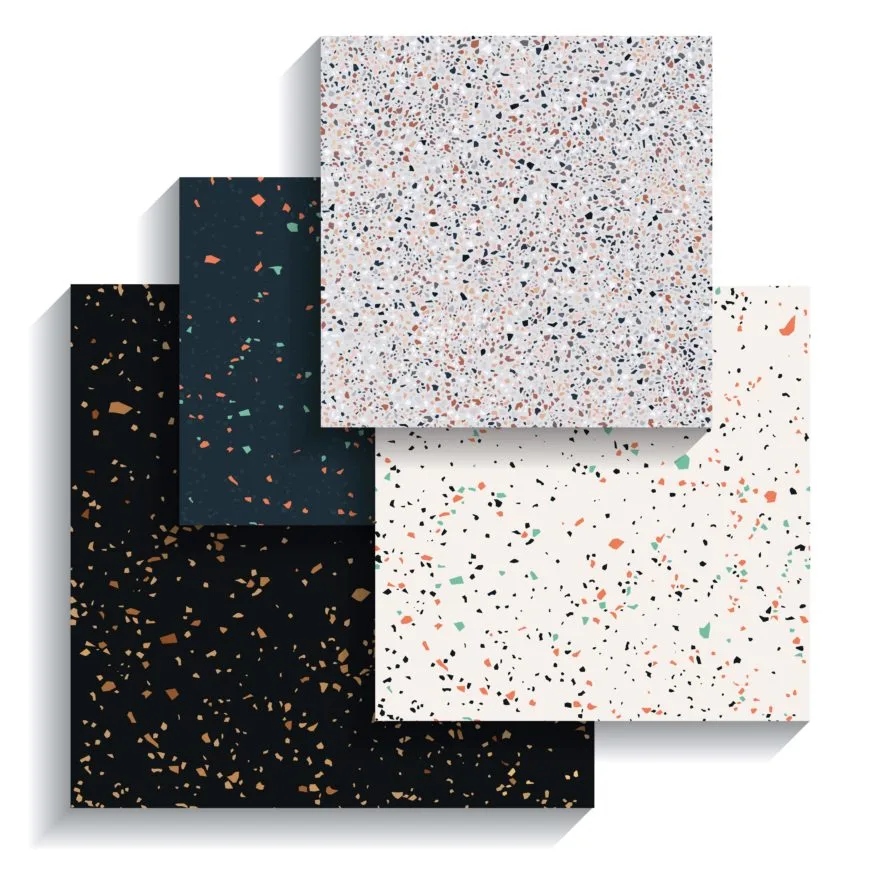
Mosaic tiles have a rich history and have been used for centuries to adorn floors, walls, and architectural features. They add a touch of artistry and elegance to any room, allowing for endless possibilities in design.
i) Types Mosaic Tiles:
Glass Mosaic Tiles:
Glass mosaic tiles are known for their reflective properties and vibrant colors. They add a sense of depth and luminosity to any space, creating a stunning visual impact. Glass tiles can be transparent, translucent, or opaque, allowing for various light effects.
They are available in a wide range of colors, finishes, and textures, offering versatility in design. Glass mosaic tiles are resistant to stains, mold, and mildew, making them suitable for both indoor and outdoor applications. They are commonly used in kitchens, bathrooms, and swimming pools to create striking focal points.
Ceramic Mosaic Tiles:
Ceramic mosaic tiles offer versatility and intricate designs due to the wide range of colors, shapes, and sizes available. They can be found in various finishes, such as matte, glossy, or textured, providing options for different design aesthetics.
Ceramic mosaic tiles are durable, resistant to stains, and easy to clean, making them suitable for high-traffic areas. They allow for the creation of detailed and complex patterns, geometric designs, or even custom images. Ceramic mosaic tiles are commonly used in bathrooms, showers, and backsplashes to add visual interest and personality.
ii) Pros and Cons:
Pros of Mosaic Tiles for Flooring:
- Visual Appeal: Mosaic tiles add creativity, artistry, and personality to any space, creating visually stunning floors.
- Versatility: Mosaic tiles come in various materials, shapes, colors, and designs, allowing for endless design possibilities.
- Durability: Mosaic tiles are durable and resistant to stains, making them suitable for high-traffic areas.
- Customization: Mosaic tiles can be customized to create intricate patterns, designs, or even custom images.
- Easy Maintenance: Mosaic tiles are relatively easy to clean and maintain, requiring regular sweeping and occasional mopping.
Cons of Mosaic Tiles for Flooring:
- Installation Complexity: Installing mosaic tiles requires skilled labor due to their small size and intricate patterns, which may increase installation costs.
- Vulnerability to Chips: Mosaic tiles may be more susceptible to chipping or cracking if not properly installed or maintained.
- Grout Maintenance: The grout lines between mosaic tiles may require regular cleaning and maintenance to prevent staining or discoloration.
- Higher Cost: Mosaic tiles, especially those made of glass or ceramic, can be more expensive compared to other flooring options.
Considering the advantages and disadvantages of mosaic tiles will help you make an informed decision when selecting them for your flooring needs.
It’s important to consider factors such as visual appeal, durability, maintenance requirements, installation complexity, and budget to choose the most suitable option for your space.
9) Terracotta Tiles
Terracotta tiles offer a rustic and earthy charm, bringing a warm and inviting atmosphere to any space. These tiles are made from natural clay and have been used for centuries due to their timeless appeal.
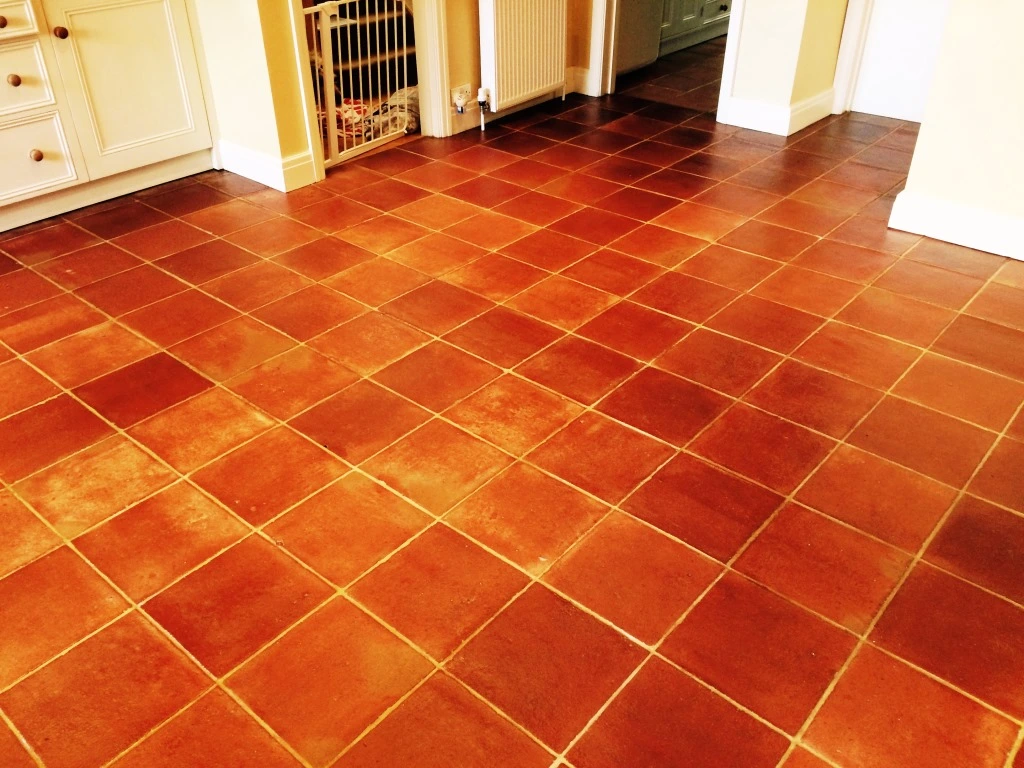
Terracotta tiles are known for their unique characteristics, including their warm color tones, textured surfaces, and natural variations. They add a touch of authenticity and elegance to both traditional and contemporary interiors, creating a cozy and welcoming ambiance.
i) Types of Terracotta Tiles:
Traditional Terracotta Tiles:
Traditional terracotta tiles are typically handmade using natural clay. They undergo a firing process that gives them their characteristic warm colors and rustic appearance. These tiles have a porous nature, which contributes to their ability to absorb and release moisture.
Traditional terracotta tiles offer a sense of authenticity and uniqueness, with each tile having its own distinct variations and imperfections. They provide a natural and organic feel to any space and are commonly used in kitchens, dining areas, and outdoor patios.
Glazed Terracotta Tiles:
Glazed terracotta tiles are coated with a protective glaze that enhances their durability and provides a wider range of color options. The glaze creates a smooth and sealed surface, making the tiles more resistant to stains and moisture. Glazed terracotta tiles offer a greater level of versatility in terms of design and aesthetics.
They can be found in various colors, finishes, and patterns, allowing for more customization and coordination with different interior styles. Glazed terracotta tiles are commonly used in bathrooms, entryways, and living areas.
ii) Pros and Cons:
Pros of Terracotta Tiles for Flooring:
- Rustic Charm: Terracotta tiles bring a rustic and earthy charm to any space, adding warmth and character.
- Natural Beauty: The natural variations and imperfections of terracotta tiles create a unique and authentic look.
- Warmth: Terracotta tiles have a warm color tone that adds coziness and comfort to a room.
- Breathability: The porous nature of terracotta tiles allows for breathability and helps regulate indoor humidity.
- Durability: Terracotta tiles are durable and can withstand heavy foot traffic when properly sealed and maintained.
Cons of Terracotta Tiles for Flooring:
- Porosity: Terracotta tiles are porous and may require regular sealing to prevent staining and moisture absorption.
- Maintenance: Terracotta tiles may require periodic resealing and more regular maintenance compared to other flooring materials.
- Susceptibility to Scratches: Unsealed terracotta tiles are prone to scratching and may require caution when moving furniture or heavy objects.
- Limited Color Options (Traditional): Traditional terracotta tiles have limited color options due to their natural firing process.
Considering the advantages and disadvantages of terracotta tiles will help you make an informed decision when selecting them for your flooring needs.
It’s important to consider factors such as rustic charm, maintenance requirements, durability, and the desired aesthetic to choose the most suitable option for your space.
10) Metal Tiles
Metal tiles offer a contemporary and industrial-style flooring option, adding a sleek and modern touch to any space. These tiles are made from various metals, such as stainless steel or aluminum, and are known for their durability, unique aesthetics, and versatility.
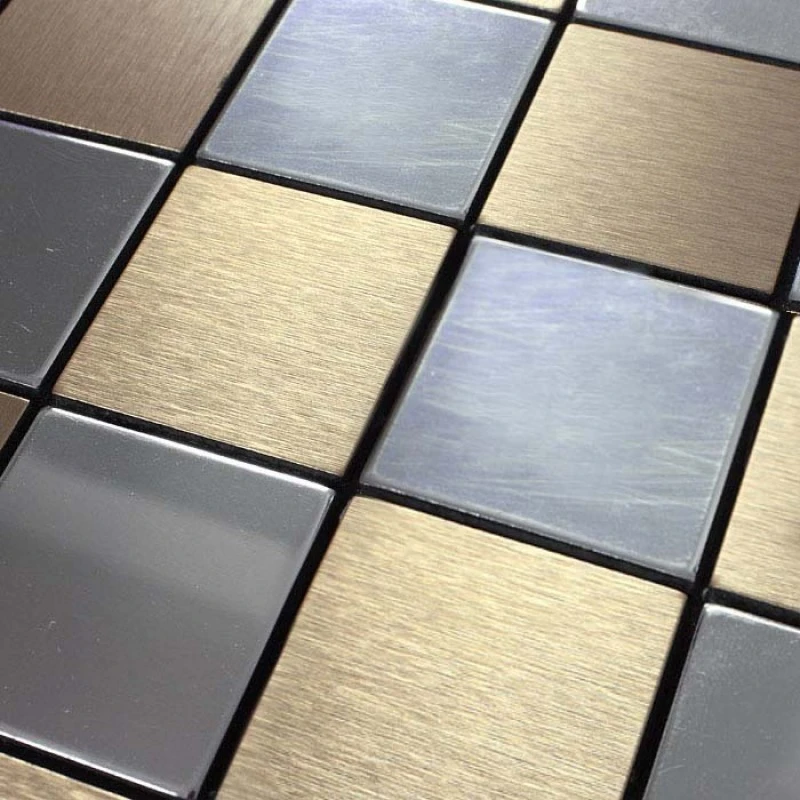
Metal tiles create a bold and sophisticated look, perfect for those seeking a statement flooring choice that combines functionality with a touch of industrial elegance.
i) Types of Metal Tiles:
Stainless Steel Tiles:
Stainless steel tiles are highly regarded for their sleek and reflective appearance. They bring a sense of sophistication and contemporary style to any room. Stainless steel tiles are resistant to corrosion, making them suitable for both indoor and outdoor applications.
They are easy to clean and maintain, withstanding the test of time. These tiles are commonly used in kitchens, bathrooms, and commercial spaces, where their durability and hygienic properties are highly valued.
Aluminum Tiles:
Aluminum tiles offer a lightweight and versatile option for flooring. They are known for their strength and durability, despite being lightweight in nature. Aluminum tiles can be easily manipulated and cut into various shapes and sizes, allowing for creative and unique designs.
They are available in different finishes, including brushed, polished, or anodized, providing options to match different design aesthetics. Aluminum tiles are commonly used in contemporary and industrial-style spaces, as well as outdoor applications due to their resistance to rust and corrosion.
ii) Pros and Cons:
Pros of Metal Tiles for Flooring:
- Contemporary and Industrial Style: Metal tiles add a modern and industrial aesthetic to any space, creating a unique and eye-catching flooring option.
- Durability: Metal tiles are highly durable and resistant to wear, providing a long-lasting flooring solution.
- Easy Maintenance: Metal tiles are easy to clean and maintain, requiring simple wiping or mopping to keep them looking their best.
- Hygienic Properties: Stainless steel tiles, in particular, have hygienic properties, making them suitable for areas where cleanliness is crucial, such as kitchens and bathrooms.
- Versatility: Metal tiles offer versatility in design and can be used to create intricate patterns or as accents to complement other flooring materials.
Cons of Metal Tiles for Flooring:
- Cold Underfoot: Metal tiles can feel cold underfoot, which may not be ideal for colder climates or areas where warmth is desired.
- Reflective Surface: The reflective surface of metal tiles may show fingerprints, smudges, or scratches more easily compared to other flooring materials.
- Installation Complexity: Installing metal tiles may require professional expertise due to their unique characteristics, which may increase installation costs.
- Higher Cost: Metal tiles, especially those made from stainless steel, can be more expensive compared to other flooring options.
Considering the advantages and disadvantages of metal tiles will help you make an informed decision when selecting them for your flooring needs.
It’s important to consider factors such as the desired aesthetic, durability, maintenance requirements, and budget to choose the most suitable option for your space.
11) Glass Tiles
Glass tiles offer a unique and visually captivating option for flooring, adding a touch of elegance and modernity to any space. These tiles are made from glass materials and are known for their distinctive reflective qualities.
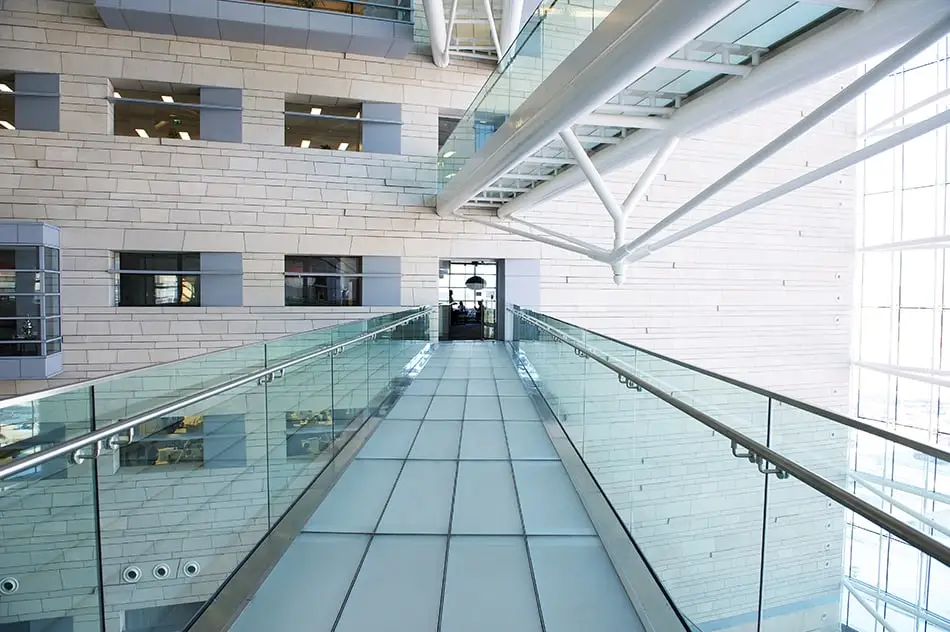
Glass tiles create a sense of depth and luminosity, allowing light to bounce off their surfaces and brighten the room.
They bring a contemporary and luxurious feel, making them a popular choice for those seeking a visually striking and sophisticated flooring option.
i) Types of Glass Tiles:
Clear Glass Tiles:
Clear glass tiles are transparent and provide a beautiful light-enhancing effect. They reflect and amplify natural and artificial light, creating a sense of spaciousness and brightness in a room.
Clear glass tiles are versatile and can be used in various design styles, ranging from minimalist and modern to classic and elegant. They can be used as accents or as the main flooring material to create a stunning focal point in any space.
Frosted Glass Tiles:
Frosted glass tiles have a textured or etched surface that diffuses light and provides privacy. The frosted finish softens the appearance of the tiles, creating a subtle and understated beauty. These tiles allow light to pass through while maintaining a level of opacity, making them suitable for areas where privacy is desired, such as bathrooms or office spaces. Frosted glass tiles come in various patterns and designs, adding visual interest and texture to the flooring.
ii) Pros and Cons:
Pros of Glass Tiles for Flooring:
- Reflective and Luminous: Glass tiles create a sense of depth and luminosity, brightening the room and enhancing the overall aesthetic.
- Versatile Design Options: Glass tiles are available in a wide range of colors, shapes, and sizes, offering versatility in design and allowing for creative patterns and combinations.
- Easy Maintenance: Glass tiles are easy to clean and maintain, requiring simple wiping or mopping to keep them looking their best.
- Stain and Water Resistance: Glass tiles are non-porous and resistant to stains and water, making them suitable for areas prone to moisture, such as kitchens and bathrooms.
- Hygienic Properties: Glass tiles are non-absorbent and do not harbor bacteria or allergens, contributing to a healthier indoor environment.
Cons of Glass Tiles for Flooring:
- Vulnerability to Scratches: Glass tiles can be susceptible to scratching, especially if not properly cared for or if heavy objects are dragged across their surface.
- Slipperiness: Some glass tiles may have a smooth surface, which can be slippery when wet. Choosing textured or anti-slip glass tiles can help mitigate this concern.
- Visible Dirt and Smudges: The reflective surface of glass tiles may show dirt, fingerprints, and smudges more easily compared to other flooring materials.
- Installation Complexity: Installing glass tiles may require professional expertise due to their delicate nature and specific installation techniques, which may increase installation costs.
Considering the advantages and disadvantages of glass tiles will help you make an informed decision when selecting them for your flooring needs. It’s important to consider factors such as the desired aesthetic, maintenance requirements, slip resistance, and budget to choose the most suitable option for your space.
12) Conclusion
In conclusion, selecting the right tile for your flooring requires careful consideration of various factors. Understanding the characteristics, advantages, and disadvantages of different tile types can help you make an informed decision.
Remember to assess your specific needs, style preferences, maintenance capabilities, and budget to choose the tile that best suits your requirements.